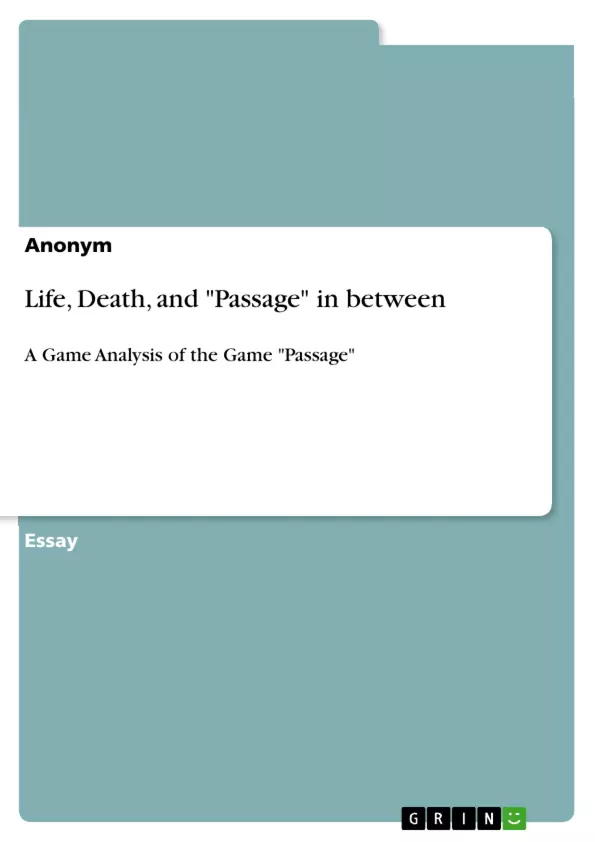"Passage" is about life, what it feels like, how we live it, and how we find happiness. It is an expression of the developer's, Jason Rohrer’s recent thoughts and feelings about life and death, structured in a five-minute-long video game with pixel graphic and music.
The following analysis discusses how the game mechanics create an atmosphere while undermining thoughts with literature and theories. Also, it interprets the game and its meaning regarding life and life decisions.
Inhaltsverzeichnis (Table of Contents)
- Passage is about life, what it feels like, how we live it, and how we find happiness (Burch).
- The strong connection between character and player is even implemented in the script, e.g. as the death of player, which will make the avatar stop moving (Willumsen 6).
- By first starting the game, the objective is unclear.
- As you must travel together from this point, it indicates a monogamous, heteronormative standard (Willumsen 6).
- As you are only able to see a single row at a time, it gives a sense that you aren't exploring a maze, but a lifetime (Play this thing).
- Some players were shocked: “And then, another tombstone: it is over. You, stone. No leaderboards, no game over screen. It simply ends” (Oliu).
- Players experience these five minutes different.
- The story of Passage is classic: a person lives their life, meet someone else or don't, they die (Oliu).
Zielsetzung und Themenschwerpunkte (Objectives and Key Themes)
Passage is a video game designed to be a memento mori experience, presenting a lifetime from young adulthood through old age and death in a five-minute span. The game aims to evoke reflection on life's choices, the impact of relationships, and the inevitability of death. It invites players to consider the meaning of life and its inherent limitations.
- The passage of time and its impact on life experiences.
- The meaning and value of relationships in life.
- The inevitability of death and its implications for living a meaningful life.
- The tension between pursuing personal goals and navigating the complexities of relationships.
- The subjective nature of experience and the importance of player agency.
Zusammenfassung der Kapitel (Chapter Summaries)
The text analyzes the video game Passage by Jason Rohrer, exploring its mechanics, narrative structure, and thematic significance. The initial sections discuss the game's premise, its minimal gameplay mechanics, and the player's experience of identifying with the nameless character.
The text then examines the game's portrayal of relationships, specifically the choice to take a spouse and its consequences. The impact of the spouse's death on the player character and the narrative is explored.
The discussion shifts to the game's representation of time and its significance within the narrative, focusing on the limited view of the game world and the player's journey through life.
Finally, the text considers the game's ending, emphasizing the lack of a traditional "game over" screen and the player's reflection on the choices made during the game. The text explores the game's ability to trigger personal reflection on life choices.
Schlüsselwörter (Keywords)
The text focuses on the following key terms and concepts: memento mori, life simulation, player agency, narrative design, game mechanics, thematic analysis, player experience, subjective interpretation, digital game, relationship dynamics, death, time, choice, and meaning.
Frequently Asked Questions
What is the video game "Passage" about?
Created by Jason Rohrer, "Passage" is a five-minute game that simulates a human lifetime, exploring themes of life, death, and happiness.
What does "Memento Mori" mean in this context?
The game acts as a "Memento Mori" (remember you must die) by forcing players to experience the rapid passage of time and the inevitability of the end.
How do relationships work in the game?
Players can choose to walk alone or with a partner. Walking with a partner limits mobility in narrow paths but represents a shared life journey.
What happens at the end of the game?
There is no traditional "game over" or leaderboard. The character simply dies, turns into a tombstone, and the game ends, triggering reflection on choices made.
Why are the graphics pixelated?
The pixel art style is a deliberate choice to focus on the abstract experience of life's journey rather than realistic distraction.
- Quote paper
- Anonym (Author), 2022, Life, Death, and "Passage" in between, Munich, GRIN Verlag, https://www.grin.com/document/1334316



